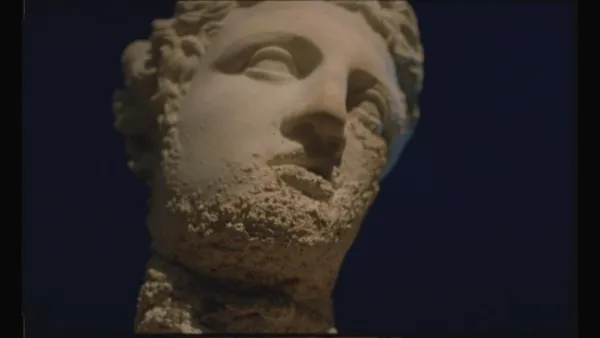Eye For Film >> Movies >> Archipelagos, Naked Granites (2014) Film Review
Archipelagos, Naked Granites
Reviewed by: Rebecca Naughten

Opening with a series of excerpts from old-style disaster and mythological legend films, Archipelagos, Naked Granites (Archipels, Granites Dénudés) brings the depiction of Greek disasters up to date in a combined essay/diary film on the state of contemporary Greece. The film mixes the personal worries and frustrations of a nameless (and unseen) narrator with vox pop answers to existential questions, encompassing a range of views and becoming a kind of generational Greek chorus.
Filming between 2013 and 2014, director Daphné Hérétakis captures an increasingly revolutionary mood on the streets of Athens, a city that the narrator finds herself unwilling to leave despite ongoing financial and personal struggles. The narrator stops reading or watching the news as the country goes into a downward spiral. She acknowledges that this is a blinkered way to live, in a bubble - but it's a form of self-protection. However, she will later state that "I want a change, but I don't know how to make it happen". The film is effectively a record of political awakening as the narrator tries to move from thoughts to actions, or even from thoughts to words said aloud - if the narrator feels that her silence is as complicit in the general inertia as the scandalised whispers that follow a young man at work trying to foment dissent, Hérétakis' film tries to give that silence a voice.

The vox pop elements reinforce this search for self-discovery and self-definition. The narrator asks questions that she is wrestling with or that are otherwise revelatory about how you define yourself as an individual - if you could change one thing about your life, what would it be? What does revolution mean? Do you still have hope? What does joy make you think of? This moves on to a more nationally-specific set of questions centring on the Acropolis - what would you do if you woke one morning to be told that it had gone? And what would it mean for the country if that were true? The answers highlight the bond between aspects of national culture and the perception of self - there are symbols that are bigger than us, that we define ourselves in relation to.
Expanding these questions and philosophical musings beyond the narrator avoids the navel gazing trap that often befalls diary films and also broadens Archipelagos, Naked Granites into a state-of-the-nation affair even within the film's relatively short duration. Hérétakis has an eye for the details of street life and in chronicling the exuberance and angst of a generation who don't see why they should accept the world as it is, she has created a vibrant and seemingly heartfelt film. It will be interesting to see how she develops on this in the future.
Reviewed on: 27 Sep 2015
















